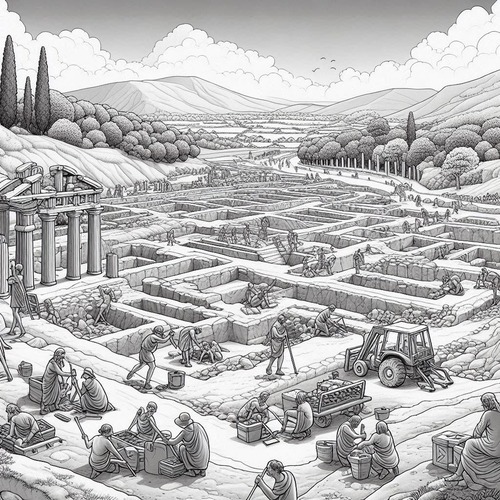New Testament Reliability: Debunking Myths and Lies
The New Testament’s Enduring Reliability
In recent times, some individuals and media outlets have spread misinformation about the New Testament. Often, these agendas contradict core Christian teachings or exploit controversy for financial gain. It’s crucial to approach such claims with a critical eye, considering the overwhelming evidence for the New Testament’s reliability…
The New Testament, foundational to the Christian Faith, has faced scrutiny regarding its reliability. However, a deep dive reveals a compelling case for the accuracy and authenticity of these ancient texts. Let’s delve into the evidence that strengthens the case for trusting the New Testament:
- A Sea of Manuscripts: Unlike any other ancient work, the New Testament boasts an unparalleled wealth of manuscript evidence. Over 5,800 Greek manuscripts exist, with thousands more in various languages. This vast collection allows for meticulous comparison and analysis, providing a robust foundation for textual verification.
- Bridging the Gap: Early Dating: Imagine having copies of a book written centuries ago, dating incredibly close to the original. This is the case with some New Testament fragments, like the John Rylands fragment (P52), which dates within decades of the original writings. This remarkably early dating minimizes the potential for significant alteration over time.
- Minor Variations, Major Message: It’s true that variations exist among the New Testament manuscripts. However, the vast majority are minor and inconsequential, often involving spelling discrepancies or stylistic choices akin to American versus British English. Importantly, these variations do not affect core Christian doctrines or teachings.
- The Meticulous Scribes: The individuals responsible for copying the New Testament manuscripts weren’t casual scribes. They were highly trained professionals who prioritized accuracy. While occasional human errors did occur, the overall transmission process was remarkably reliable, ensuring the core message remained intact.
- Corroboration from Early Church Leaders: Early Christian leaders like Clement of Rome and Polycarp frequently quoted the New Testament in their writings. These citations serve as valuable external evidence, demonstrating the textual consistency of the New Testament message across different geographical locations and early Christian communities.
- A Chorus of Agreement: Despite some variations, the manuscripts exhibit a remarkable level of agreement on essential doctrines and teachings. This consensus across diverse manuscripts strengthens the case for a reliable and consistent transmitted text.
- Aligning with History: The historical accuracy of the New Testament is bolstered by its alignment with archaeological discoveries and other ancient sources. Details and narratives presented in the New Testament correspond with known historical events and cultural contexts of the time period.
- Enduring Through Challenges: The manuscripts haven’t had an easy journey. Despite historical upheavals and attempts to discredit them, the manuscripts have been preserved and transmitted faithfully for centuries. This continuity speaks volumes about the enduring impact and significance of the New Testament.
- The Weight of Scholarly Opinion: Regardless of personal beliefs, most biblical scholars acknowledge the general reliability and authenticity of the New Testament. This consensus is based on extensive analysis of the vast manuscript evidence and historical data.
- Faith and Providence: For believers, God’s providence plays a role in preserving His Word. The enduring availability and profound impact of the New Testament across millennia signify divine oversight throughout the ages.
Conclusion:
Scrutiny of the New Testament is not inherently negative. It compels us to delve deeper and appreciate the robust evidence supporting its reliability. The vast manuscript tradition, early dating, textual analysis, historical consistency, and scholarly consensus all affirm the integrity and reliability of the New Testament as a faithful record of the Christian message. While questions may arise, a closer look dispels doubts and underscores the enduring authenticity of these ancient texts.
Related Reads:
- Papyri and Dead Sea Scrolls: Archaeology Endorses Scripture
- Historical Reliability of the Bible: Astonishing Archaeological Finds
- Canonicity: The Journey to the Bible We Know Today
- Unearthing the Past: Excavation Findings that Validate Bible Narratives
- Bible ‘Contradictions’: Hurdles to Faith? Not Quite
- Connecting the Dots: Undesigned Coincidences Reaffirm Bible Truth
Editor's Pick

Christian Obedience: God’s Empowerment or an Act of Our Will?
Every Christian knows the struggle. You’re fighting a besetting sin—again. You’ve resolved to do better—again. And you’re wondering: Should I [...]

The Throne-Room Vision: Who Did Isaiah See?
The scene is unforgettable: Isaiah stands in the temple, and suddenly the veil between heaven and earth tears open. He [...]

The Angel of the Lord: Can We Be Certain It Was Christ All Along?
Throughout the Old Testament, a mysterious figure appears: the Angel of the LORD. He speaks as God, bears God’s name, [...]
SUPPORT US:
Feel the Holy Spirit's gentle nudge to partner with us?
Donate Online:
Account Name: TRUTHS TO DIE FOR FOUNDATION
Account Number: 10243565459
Bank IFSC: IDFB0043391
Bank Name: IDFC FIRST BANK






